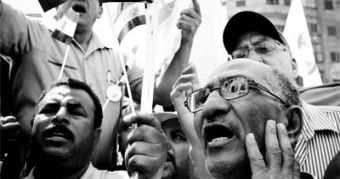
It is known that 30% of the Egyptian economy is controlled by the military: from gas stations to tourist companies. City mayors and governors are often retired military men. Therefore, M. Morsi’s desire to place his men in key posts in the regions was met with hostility in military circles. The generals were completely against the idea of war with Ethiopia, called for by the “Muslim Brotherhood”, due to the construction of a dam on the Blue Nile.
Western political scientists hold two positions about the events taking place in Egypt. Some see it as the revenge of the “militarists”, who overthrew the democratically elected president, calling for the support the new government. Others believe that the generals fulfilled the will of the people and the most progressive sectors of society, preventing the outbreak of civil war.
At the same time, the military understands that they cannot retain power on their own. Islamists have de facto turned into something stronger, and they are more determined to win than those who are in favor of liberal and secular standards of living in the country. The problem lies in the fact that at the middle and lower levels of government, the Islamist movement operates independently. They have a strong desire to go all the way and secure the release of M. Morsi as well as reverse the results of the transfer of power to the hands of the military. The “Muslim Brotherhood” is ready to start a civil war, though have so far refrained from doing so, believing that sooner or later the military will be forced to release M. Morsi and call an election, during which the Islamists hope to take revenge.
All this is reminiscent of the 1991 Algerian scenario, where the military refused to recognize the victory of the Islamists in the elections in the country. As a result, Algeria was engulfed in civil war for 10 years, causing the deaths of more than half a million people.
The dead-end situation, in our opinion, is due to the insolvency of Islamic theorists and practitioners in managing the country to address its complex internal problems. Evidence of this lies in the fact that in no country of the “Arab Spring” did Islamists manage to gain a foothold in government. Thus, the first surrendered their position to radicals in Libya, making way for Ali Zeidan and Mahmoud Jibril. While there are Islamists who retain influence in parliament, their chances of gaining complete control of the country is very small. In Tunisia, the military still retain the loyalty of the Islamist government of an-Nahda, yet operate in an extremely tenuous position, against the background of the growing youth movement “Rebellion”, which began the fight against the Islamization of the country, and could also lead to the repetition of the situation in Egypt.
An analogous situation exists in Turkey, where the Islamization of the country under T. Erdogan has contributed to growing discontent of significant segments of its population, including the secular part of the middle class as well as the Alawites and Kurds.
You can attribute the anti-Islamist movement’s growing momentum in Egypt, Tunisia and Libya to Qatar’s diminishing role as sponsor of the “Muslim Brotherhood” movement due to financial problems. The same applies to the Hamas movement, which has been gradually subsiding, returning to Iran’s separate sphere of influence.
In governing Egypt decisive action, all the way to banning the “Muslim Brotherhood” in order to prevent civil war and the country from descending into chaos, has been supported by Defense Minister General Abdel Fattah al-Sisi, and Prime Minister Hazem al-Beblawi. Interim President of Egypt Adly Mansour is hesitant, but “Washington’s man” Mohamed ElBaradei has announced his resignation, strengthening the position of General al-Sisi, who has positioned himself as the new leader of the country.
The harsh actions of Egyptian security forces in breaking up supporters of ex-President M. Morsi have led to a review of the Western community’s relations with the new leadership of the country. Egypt’s military and police have been accused of extreme use of force. On the one hand, Washington, positioning itself as a defender of human rights around the world, has advised the country’s leaders to respect people’s rights to freedom of expression and assembly, referring to the actions of the authorities as “military repression”. As a practical step, the yearly US-Egyptian “Bright Star” military exercises have been cancelled. On the other hand, the American demarche has not resulted in the cancelation of its $ 1.3 billion in annual financial aid to Egypt. This suggests that Washington has not yet fully defined its stance with respect to the events in Egypt, the beginning of which was the decision to swap ally Hosni Mubarak for the Islamists.
In our view, the situation in Egypt could seriously worsen in the near future. The Army has begun to cleanse the political field of the “Muslim Brotherhood” and civil war could become an everyday reality. This will have resounding implications for the country as well as the region as a whole.
Vladimir Karyakin, Candidate of Military Sciences, leading researcher at the Department of Defence Policy at the Russian Institute of Strategic Studies, especially for the online magazine “New Eastern Outlook”.